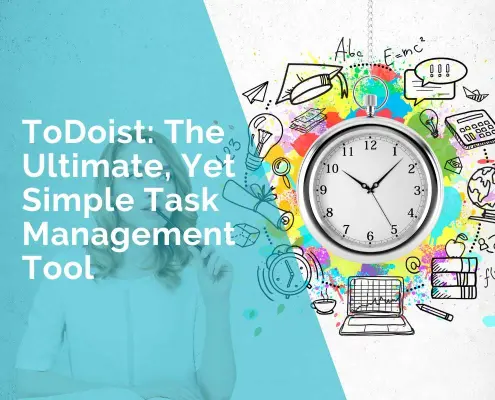How Can Marketing Teams Balance Creativity and Deadlines? 7 Productivity Hacks
Balancing creativity and deadlines is a tightrope walk for most marketing teams. On one side, there is the pressure to be at their creative best and think outside the box. On the other, there is the ticking clock, demanding results and efficiency.
The key lies in finding a rhythm where creativity isn’t stifled, but deadlines are still met with precision. In this article, we will give you 7 hacks that will keep your marketing team sharp and organized – without sacrificing that spark of originality.
Why Marketing Teams Need to Balance Creativity and Deadlines
It’s no surprise that customers today have easy access to information through digital platforms, which makes it easy to know about and compare products and services. In 2024, over 5 billion people actively used the internet and social media platforms.
It is the reason why marketing teams have to curate compelling content to stand out and communicate value effectively. Creativity is essential to developing engaging content that fosters emotional connections with audiences. It must also fuel innovation to make campaigns memorable and impactful.
However, marketing agencies have to deal with multiple clients simultaneously and meet deadlines. Therefore, it is crucial to maintain momentum, ensure timely campaign launches, and capitalize on market trends and opportunities.
Any hindrance or delay disrupts project flow and negatively impacts client satisfaction. Only balancing creativity and deadlines can produce high-quality campaigns that resonate with customers. The efforts contribute to business growth while maintaining a productive and motivated team.
7 Challenges Marketing Teams Face
Technology and digital trends will continue to evolve as we move forward, so marketing teams have to adapt and adjust every moment. The challenge of changing trends, tight deadlines, and increasing workloads impact creativity and productivity the most. Let us review the challenges in detail
1. Pressure to Produce High-quality Work Quickly
One constant challenge in the marketing workplace is the need to fulfill client’s expectations within a given time limit. Teams often struggle to balance creativity with efficiency. Almost 41% of employees say that stress due to time constraints makes them less productive. For some team members, the pressure can be overwhelming and lead to burnout, decreased productivity, and a decline in the quality of work.
2. Pressure to Justify the Time Spent on Experimental Ideas
In most firms, the marketing teams have to justify the time spent on concepts and blueprints, more so when results are not immediate. Investing in creative and untested strategies is challenging if management chooses short-term gains over long-term innovation.
The pressure can constrain creativity, as teams and individuals may shy away from bold ideas and go for safe and proven approaches. However, experimenting with new concepts is vital to keeping pace with the latest trends and being competitive.
3. Inappropriate Allocation of Resources
The crucial elements or resources in a marketing agency are time, budget, and creative talent. Inappropriate allocation in either one can hinder a team’s overall effectiveness. When resources are misdirected towards low-impact tasks or areas with little ROI (return on investment), then it leads to inefficiencies and missed opportunities.
The problem often arises due to unclear priorities, poor planning, or shifting goals. High-priority clients or projects lack the necessary support, while less impactful tasks consume the available resources.
4. Difficulty Maintaining Brand Consistency Under Tight Deadlines
Maintaining brand consistency under tight deadlines is a major concern. With limited time, a rush in content creation and delivery leads to deviations from standard brand guidelines.
The team may not notice it while planning and executing but feel differences in messaging, tone, visual identity, and misalignment with the brand’s values. The challenge is to ensure all materials remain cohesive and aligned with the brand’s overall strategy.
5. Disrupted Creative Flow Due to Rigid Time Management Systems
Creative individuals give their best when given ample time and resources. Creative processes require flexibility, allowing for brainstorming, iteration, and exploration of new ideas.
With strict schedules and rigid timelines, the teams focus solely on deadlines, with less room for creativity. The result is uninspired, formulaic work that lacks originality and impacts the quality and effectiveness of said marketing campaigns.
6. Delayed Feedback Cycles Disrupting Workflows
When feedback is slow, team members are left waiting for approval or direction. This causes delays in content development, revisions, and decision-making. The lack of timely input can result in rushed work, unsatisfactory quality, and a disconnect between the blueprint and the final product. Delayed feedback cycles halter the seamless flow as marketing teams have to come back and forth and do revisions until approval.
7. Risk of Creative Burnout Among Team Members
The continuous demands for fresh, high-quality content overwhelm team members. The individuals within the team may feel exhausted and uninspired, and not work with a creative spark. Without proper work-life balance, support, and breaks, burnout results in decreased productivity, subpar work, and high turnover rates.
7 Productivity Hacks for Marketing Teams to Balance Creativity and Deadlines
Achieving a balance between creativity and deadlines is a struggle for most marketing teams. However, effective productivity solutions can make all the difference. By using the strategies below, teams can streamline workflows, boost efficiency, and maintain creative momentum.
1. Reverse Deadlines to Prioritize Creative Ideation Upfront
Reverse inversion is a thinking method to get novel solutions or prevent potential setbacks. The process involves you thinking the opposite of what you want to achieve or want to happen. While working backward, you can identify the challenges, results, and alternatives.
You can set deadlines for brainstorming and concept development before the official project deadlines. The method ensures that creativity is not rushed and there is room for thoughtful and innovative ideas.
2. Use Time-tracking Software to Monitor Task Durations
Using the TimeBee time-tracker for marketing teams is an effective hack to track time spent on each task and project. The app is primarily a productivity and workforce management app that provides insights into the marketing team’s daily work hours and how resources are allocated across different projects.
By curating resource allocation, marketing teams can ensure they are dedicating enough time to creative brainstorming while staying on track with deadlines. TimeBee helps divide time efficiently between tasks, so teams can prioritize creative work without compromising on other operational responsibilities.
TimeBee’s billing feature ensures that time spent on various tasks is accurately tracked for client projects. Setting time limits ensures workflow and improves transparency and accountability.
Teams can better streamline the tasks, avoid overburdening specific team members, and identify areas for improvement. TimeBee’s time tracker for marketing teams streamlines creative output and time management processes that ultimately lead to better results within tighter timelines.
3. Schedule Dedicated Brainstorming Sessions with Clear Time Limits
Brainstorming is a lateral thinking method where discussion fuels and sparks creative solutions. However, the art is to conduct a session with a certain time limit. By setting aside focused time for idea generation, marketing teams can dive into creative thinking without distractions.
Clear time limits ensure the process remains efficient, preventing overthinking or endless revisions. The teams can come up with fresh, innovative ideas within a set timeframe, and meet deadlines without compromising creativity
4. Promote Diversity and Inclusion for Innovative Ideas
Promoting diversity and inclusion is another hack to balance creativity and deadlines. A diverse team, with a mix of backgrounds, genders, and cultures, can bring different perspectives that lead to more innovative solutions.
However, you need to go beyond that and also consider demographics. With 24% of males and 15% of females aged 65 and older still active in the workforce, tapping into a variety of experiences and viewpoints can enrich your team’s creative output.
A mix of generations, backgrounds, and skill sets promotes innovative thinking and allows for more creative solutions, especially when working under time constraints. Senior professionals can share insights from their experience to guide the team in refining ideas quickly, while younger members can introduce new methods and approaches that speed up creative execution.
5. Rotate Team Leads to Spark Fresh Approaches
Rotating team leads is an effective hack to balance creativity and deadlines. Frequently changing team leaders help to bring fresh ideas and rejuvenate the team. The new leads’ will bring new perspectives and share knowledge that can spark problem-solving strategies.
The purpose of rotation is to prevent creative stagnation and help teams stay engaged. With shared responsibility and accountability, deadlines are met while maintaining creative standards.
6. Host “Creativity Sprints” with a Focused Objective and Time Cap
Creativity sprint is an amazing time-bound approach focused on boosting productivity and solving problems through a team effort. In marketing, the creative exercise stretches for one or two hours, where the team brainstorms ideas without distractions or interruptions.
These short sessions help to develop ideas and test them with the target audience before executing them in a campaign. This approach involves clear goals, a set timeframe, creative techniques like brainstorming, mind mapping, sketching, and an iterative process.
7. Break Larger Projects into Smaller, Manageable Milestones
The most common tactic to balance creativity and deadline is to break down the tasks. According to the skill and expertise of the team members, the complex tasks can easily be divided. This way, individuals can spend adequate time, and the collective effort will ensure both creativity and quality are maintained.
Final Words
In conclusion, balancing creativity and deadlines is essential for marketing teams to produce impactful, high-quality campaigns. By implementing productivity hacks like reverse deadlines, brainstorming sessions, priority matrices, and creative sprints, teams can maintain both innovative thinking and efficiency.
Strategies like implementing a time-tracking tool, rotating team leads, and breaking projects into smaller tasks further enhance collaboration and keep the creative process flowing smoothly. With the right tools and approach, marketing teams can stay productive, meet deadlines, and consistently deliver results with their creativity and skills.
***************
Allen Donald












